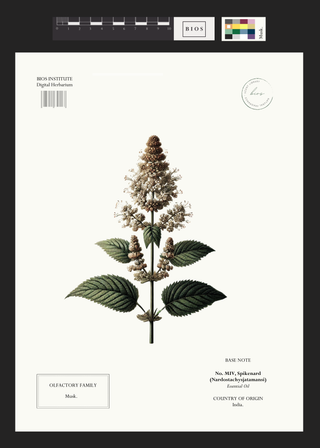

Nardostachys jatamansi, commonly known as Indian valerian or spikenard, is native to the Himalayan region of Asia. Its natural range includes countries such as India, Nepal, Bhutan, and parts of China. Ours is sourced from India.
In India, Nardostachys jatamansi is found in the temperate and subalpine regions of the Himalayas, typically growing at altitudes between 3,000 to 5,000 meters (9,800 to 16,400 feet) above sea level. It is a perennial herbaceous plant with fragrant rhizomes and small, pinkish flowers.
Spikenard essential oil has a complex and distinct fragrance. It is characterized by its deep, musky, and woody notes with hints of earthiness and sweetness. The scent is often described as warm, exotic, and grounding.
Spikenard is a Base note in our Musk family,, providing depth and complexity to fragrance compositions. Its unique aroma adds a touch of richness and warmth to perfumes, making it a popular choice in oriental, woody, and spicy fragrances.
Spikenard has a rich history dating back to ancient times. It has been highly prized for its fragrance and was mentioned in various ancient texts and religious scriptures. In biblical times, it was used as a perfume and was believed to have spiritual and healing properties.
Spikenard has cultural and spiritual significance in various traditions. In Ayurveda, the traditional Indian system of medicine, it is believed to have calming and grounding properties. In some cultures, spikenard is associated with spiritual practices, meditation, and relaxation.
Spikenard has been used in perfumes, cosmetics, and natural remedies for centuries. It was often used in high-end perfumes and luxury products due to its unique and captivating aroma. In addition, it has been used in traditional medicine for its potential therapeutic properties, such as promoting relaxation and soothing the skin.
Overall, spikenard is a highly valued and versatile ingredient in perfumery. Its deep and exotic fragrance adds a touch of intrigue and warmth to fragrance compositions, making it a cherished component in many perfumes throughout history.
Spikenard has a long history of use in religious and spiritual practices. It is mentioned in several religious texts, including the Bible, where it is associated with acts of devotion and anointing. In biblical stories, spikenard was used to anoint the feet of Jesus, symbolizing reverence and offering.
Spikenard has been used in traditional medicine systems, such as Ayurveda and traditional Chinese medicine, for its potential therapeutic properties. It is believed to have calming and grounding effects on the mind and body, and has been used to alleviate stress, promote relaxation, and support skin health.
In some cultures, spikenard is used in rituals, ceremonies, and cultural practices. It may be burned as incense or used as a fragrance to create a sacred atmosphere during meditation, prayer, or other spiritual practices. The aromatic qualities of spikenard are believed to help induce a state of calm and promote a sense of connection.
Spikenard is often associated with qualities such as purity, devotion, and spiritual enlightenment. Its rich and distinctive fragrance is seen as a metaphor for the divine essence or higher consciousness. In this context, spikenard may be used to enhance rituals, ceremonies, or personal practices aimed at cultivating spiritual awareness or inner transformation.
Spikenard
- Unit price
- /per
Please note this product format is a small vial that contains roughly 20 drops of scent concentrate. This can be purchased à la carte but is intended to be used with our Perfume Kit.
SCENT SPECIFICATIONS
Latin Name: Nardostachysjatamansi
Extraction Method: Steam Distilled
Country of Origin: India
All of the scents in our library are naturally derived - our collection includes essential oils, absolutes, concretes, isolates, enfleurage, macerations, oleoresins, and mixed medium naturals.
Adding product to your cart
Nardostachys jatamansi, commonly known as Indian valerian or spikenard, is native to the Himalayan region of Asia. Its natural range includes countries such as India, Nepal, Bhutan, and parts of China. Ours is sourced from India.
In India, Nardostachys jatamansi is found in the temperate and subalpine regions of the Himalayas, typically growing at altitudes between 3,000 to 5,000 meters (9,800 to 16,400 feet) above sea level. It is a perennial herbaceous plant with fragrant rhizomes and small, pinkish flowers.
Spikenard essential oil has a complex and distinct fragrance. It is characterized by its deep, musky, and woody notes with hints of earthiness and sweetness. The scent is often described as warm, exotic, and grounding.
Spikenard is a Base note in our Musk family,, providing depth and complexity to fragrance compositions. Its unique aroma adds a touch of richness and warmth to perfumes, making it a popular choice in oriental, woody, and spicy fragrances.
Spikenard has a rich history dating back to ancient times. It has been highly prized for its fragrance and was mentioned in various ancient texts and religious scriptures. In biblical times, it was used as a perfume and was believed to have spiritual and healing properties.
Spikenard has cultural and spiritual significance in various traditions. In Ayurveda, the traditional Indian system of medicine, it is believed to have calming and grounding properties. In some cultures, spikenard is associated with spiritual practices, meditation, and relaxation.
Spikenard has been used in perfumes, cosmetics, and natural remedies for centuries. It was often used in high-end perfumes and luxury products due to its unique and captivating aroma. In addition, it has been used in traditional medicine for its potential therapeutic properties, such as promoting relaxation and soothing the skin.
Overall, spikenard is a highly valued and versatile ingredient in perfumery. Its deep and exotic fragrance adds a touch of intrigue and warmth to fragrance compositions, making it a cherished component in many perfumes throughout history.
Spikenard has a long history of use in religious and spiritual practices. It is mentioned in several religious texts, including the Bible, where it is associated with acts of devotion and anointing. In biblical stories, spikenard was used to anoint the feet of Jesus, symbolizing reverence and offering.
Spikenard has been used in traditional medicine systems, such as Ayurveda and traditional Chinese medicine, for its potential therapeutic properties. It is believed to have calming and grounding effects on the mind and body, and has been used to alleviate stress, promote relaxation, and support skin health.
In some cultures, spikenard is used in rituals, ceremonies, and cultural practices. It may be burned as incense or used as a fragrance to create a sacred atmosphere during meditation, prayer, or other spiritual practices. The aromatic qualities of spikenard are believed to help induce a state of calm and promote a sense of connection.
Spikenard is often associated with qualities such as purity, devotion, and spiritual enlightenment. Its rich and distinctive fragrance is seen as a metaphor for the divine essence or higher consciousness. In this context, spikenard may be used to enhance rituals, ceremonies, or personal practices aimed at cultivating spiritual awareness or inner transformation.
